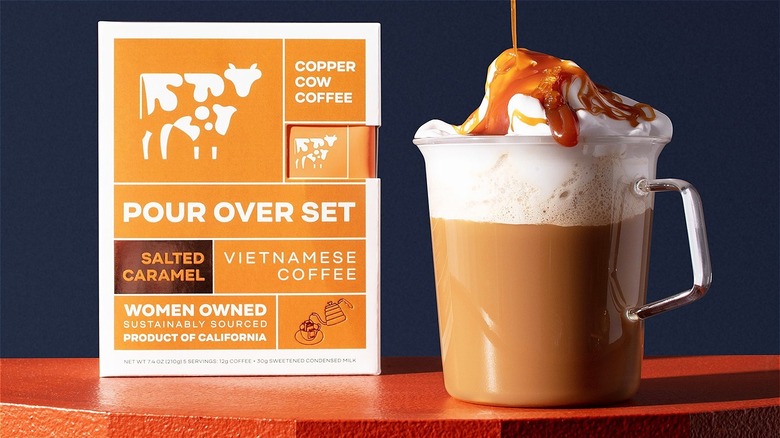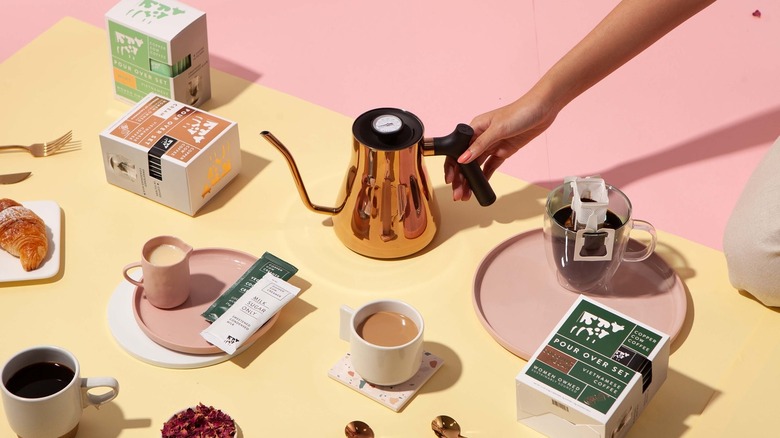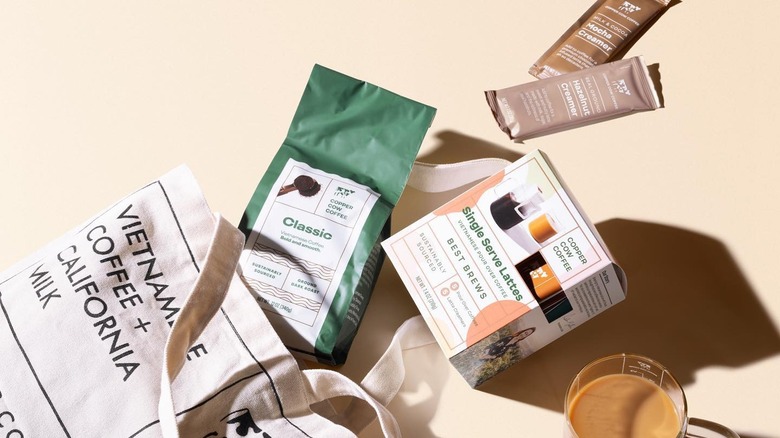What Happened To Copper Cow Coffee After Shark Tank?
ABC's reality hit series "Shark Tank" welcomes dozens of contestants every season, airing 100 of them. These hopeful entrepreneurs present everything from toileting aids (really) to online prenups and everything you can imagine in between (via All Shark Tank Products). Since it went on the air 13 seasons ago in 2009, the show has welcomed well over 1,000 would-be entrepreneurs and their products. Of that staggering number of innovations and inventions, a surprising number of them are food or food related. In Season 12, for example, more than a third of the products introduced were either food or beverages themselves, like Aura Bora, or food-related products such as the Cheese Chopper.
As we gear up for Season 14 of the popular show, everyone's starting to wonder what happened to their favorites from past seasons. One of the F&B products seen in Season 12 was Vietnamese coffee company, Copper Cow Coffee. Here's what the brand has been up to since appearing in front of the Sharks.
What Copper Cow Coffee brought to the table
Copper Cow Coffee founder Debbie Wei Mullin sought to bring Vietnamese coffee to the masses. Despite the beverage's limited ingredients list, how people around the world drink coffee varies enormously. Those in Vietnam, where Mullin's mother was born, like a creamy blend made with sweetened condensed milk. Mullin told the Sharks that she grew up drinking the caramelly brew, but as an adult found it hard to find in coffee shops and a hassle to make herself. That's why she invented a no-muss, no-fuss, single-serving iteration of the drink. No special equipment is required, and you don't have to crack open an entire can of condensed milk to make it.
One standout aspect of Copper Cow Coffee is the biodegradable pour-over coffee filter. Common in Japan, the filter comes pre-packed with Vietnamese-grown coffee and looks somewhat like a tea bag. All you need to make this treat is hot water; a tube of California grown, preservative-free condensed milk is included in the package.
Mullin asked the Sharks for a lofty $600,000 in exchange for 4% equity in her brand. She had good reason to be so confident, as she'd already done a lot of leg work before appearing on the show by selling in department stores and high-end retailers, including Williams-Sonoma, per Modern Retail. In the end, she took a deal with Robert Herjavec for $600,000 in exchange for 5.5% of her company, with an added 1.5% in advisory shares (via Shark Tank Recap).
Copper Cow Coffee after Shark Tank
Changes in Copper Cow's business are as much due to pivots that Mullin made during the pandemic as they are to any help from "Shark Tank," according to an interview the founder gave with Modern Retail after her episode, taped mid-pandemic, aired. Prior to COVID-19, 90% of the brand's profits came from wholesale, and half of those were from department store sales. When the pandemic hit, these sales went dead, and the brand even lost its contracts as shoppers feared to venture into confined spaces, with malls shuttering their doors for public safety.
Instead of giving up when half her revenue stream disappeared, Mullin persevered. Throughout the pandemic, grocery stores remained open. Though Mullin says the margins were thinner than with department stores, it opened up a huge market. According to Shark Tank Blog, the brand is now available in more than 3,000 grocery stores, including Whole Foods, Walmart, and Sprouts, as well as online at Thrive Market. Copper Cow Coffee also upped its direct-to-consumer website sales significantly, and the brand later branched out to include three kinds of tea. While the deal with Herjavec ultimately fell through, Copper Cow Coffee seems to be doing a-OK on its own. Its annual revenue, as of June 2022, rang in at $3 million.


